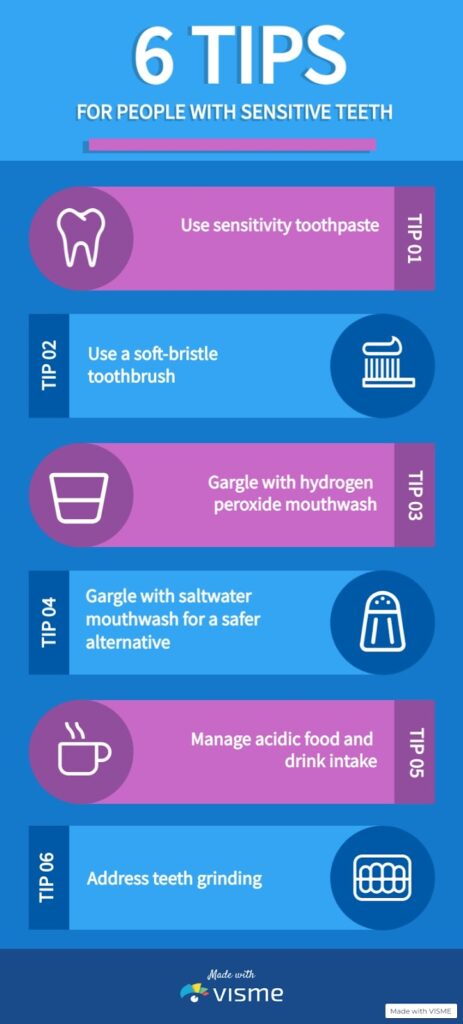Tooth sensitivity or dentin hypersensitivity is the heightened sensations in the teeth. It is caused by teeth or gum damage that exposes dentin that contains nerve endings. Below, we will discuss the signs, symptoms, and tips for alleviating dental sensitivity.
Signs and Symptoms of Sensitive Teeth
You have sensitivity teeth if you are experiencing pain or heightened sensations when:
- Consuming hot, and cold foods and drinks
- Consuming sweet or very acidic foods and drinks
- Breathing in cold air
Causes of Sensitive Teeth: Why is it so Painful?
Sensitive teeth happen when the nerves in the teeth become exposed to elements. Exposure occurs when the teeth’ protective layerings are worn down or gums recede. The protective layers are enamel, which protects the tooth, and cementum, which covers the dentin. The dentin contains nerve endings in its microscopic tubules.
The sensations experienced by the nerve endings are heightened to the point of discomfort.
Before we can treat dental sensitivity, we must find out what is causing it. Here are some factors that can cause gum recession and tooth damage, leading to sensitivity.
Tartar Buildup, Tooth Decay and Cavities
Food particles cause an acidic environment for bacteria to thrive. This leads to form tartar buildup or dental plaque. Its bacteria can eat away the enamel and cause gums to recede. It also causes tooth decay that leads to cavities.
Highly Acidic Foods and Liquids
Highly acidic foods and drinks like coffee and tea can wear away tooth enamel. Frequent exposure to stomach acid from gastroesophageal reflux disease (GERD) or bulimia can also wear away the teeth’s protective layering.
Aggressive Brushing
Enamel damage can be caused by using a hard-bristled toothbrush or aggressively brushing the teeth. Aggressive brushing, especially in a horizontal position, can cause gums to recede and lead to tooth sensitivity.
Fractured Teeth, Teeth Grinding, and Worn Fillings
Fractured teeth and worn fillings cause tooth dentin and its nerve endings to be exposed to the elements even if the enamel isn’t worn down. Teeth grinding, or even grinding teeth while sleeping (bruxism), can also expose tooth nerve endings.
Gum Disease
Bacterial infection in the gums can cause gum inflammation, tooth pain, and sensitivity. Gum disease can cause teeth to loosen. If left untreated, teeth can fall out.
Dental Care Tips for Sensitive Teeth: How do You Stop Sensitive Teeth Pain Fast?
Oral care for sensitive teeth boils down to treating the cause. Here is a short list of quick remedies that you can do for mildly sensitive teeth:
- Use sensitivity toothpaste
- Use soft-bristle toothbrush
- Use hydrogen peroxide mouthwash
- Use saltwater mouthwash
- Manage acidic food and drink intake
- Address teeth grinding
Let’s delve into the essential dental care tips for dentin hypersensitivity, exploring remedies to alleviate the discomfort and maintain your dental health.
Use Sensitivity Toothpaste for Worn Enamel
Sensitivity toothpaste works in two ways: 1.) It covers the exposed dentinal tubules, or 2.) It desensitizes the tooth’s nerve endings. It also contains fluoride which strengthens the tooth enamel.
Use a Soft-Bristled Toothbrush and Gentle Strokes to Address Aggressive Brushing
Soft-bristle toothbrushes exert less pressure on teeth and gums. The American Dental Association also encourages using angled or multi-layered bristles if people feel that soft-bristle brushes are too soft for them. Electric toothbrushes are also safe to use as they have soft bristles to balance the pressure they may exert on the teeth from their rotation and vibration.
Here is a video from Colgate on how to brush properly.
Hydrogen Peroxide Mouthwash to Reduce Bacterial Growth
Hydrogen peroxide mouthwash must be gargled with care. It has antibacterial properties that can disinfect the inside of your mouth. Gum redness or irritation can occur after gargling hydrogen peroxide mouthwash, which should disappear after a few hours.
- Combine one part of 3% concentration hydrogen peroxide with two parts of water.
- Gargle the mouthwash for 60 seconds (do not gargle for more than 90 seconds) and spit it out.
Saltwater Mouthwash to Reduce Bacterial Growth
Saltwater mouthwash is a safe alternative for children and people who can’t gargle without swallowing. It decreases the acidic environment in your mouth and lets bacteria thrive. Saltwater also draws out excess fluid in gum infection.
Due to these reasons, saltwater soothes tooth pain long enough for you to be able to see your dentist. Gargle saltwater mouthwash consisting of a teaspoon of salt stirred in 8 ounces of warm water.
Manage Intake of Acidic Foods and Drinks
As acidic content causes enamel damage, one can reduce intake of acidic foods and drinks. While people may not let go of their morning coffee that easily, they can use straws to lessen contact with acidic drinks from their teeth. They can also drink water to balance out the pH level in their mouth after eating acidic foods like sugary products.
Address Teeth Grinding
When a person is anxious or stressed, they can grind their teeth without realizing it and also in their sleep. Getting active, relaxing the jaw, and investing in a mouthguard can help address teeth grinding.
When to Visit a Dentist for Teeth Sensitivity
American Association of Endodontists (AAE) states that you must consult your dental professional if your tooth sensitivity lasts more than 30 seconds after consuming hot or cold food or drink.
Another indicator that you must visit your dental professional is if your tooth pain is ongoing or severe. These symptoms can indicate that you may have a tooth cavity, exposed tooth nerve endings, or gum condition.
Your dental professional may do the following:
- Strengthen the tooth enamel with in-office application of fluoride gel.
- Repairing fractured teeth with crown, inlay, or bonding.
- Surgical gum grafting to protect the root and reduce sensitivity
- If sensitivity is severe or persistent and cannot be treated by other means, they may recommend a root canal to eliminate the problem.
Sensitive Teeth and Your Dental Health
Tooth sensitivity can be caused by enamel damage and gum problems. Mildly sensitive teeth can be managed with the tips provided above. With long-term management, people with sensitive teeth can maintain their oral health. However, if your symptoms are severe, please don’t hesitate to schedule an appointment with us.


